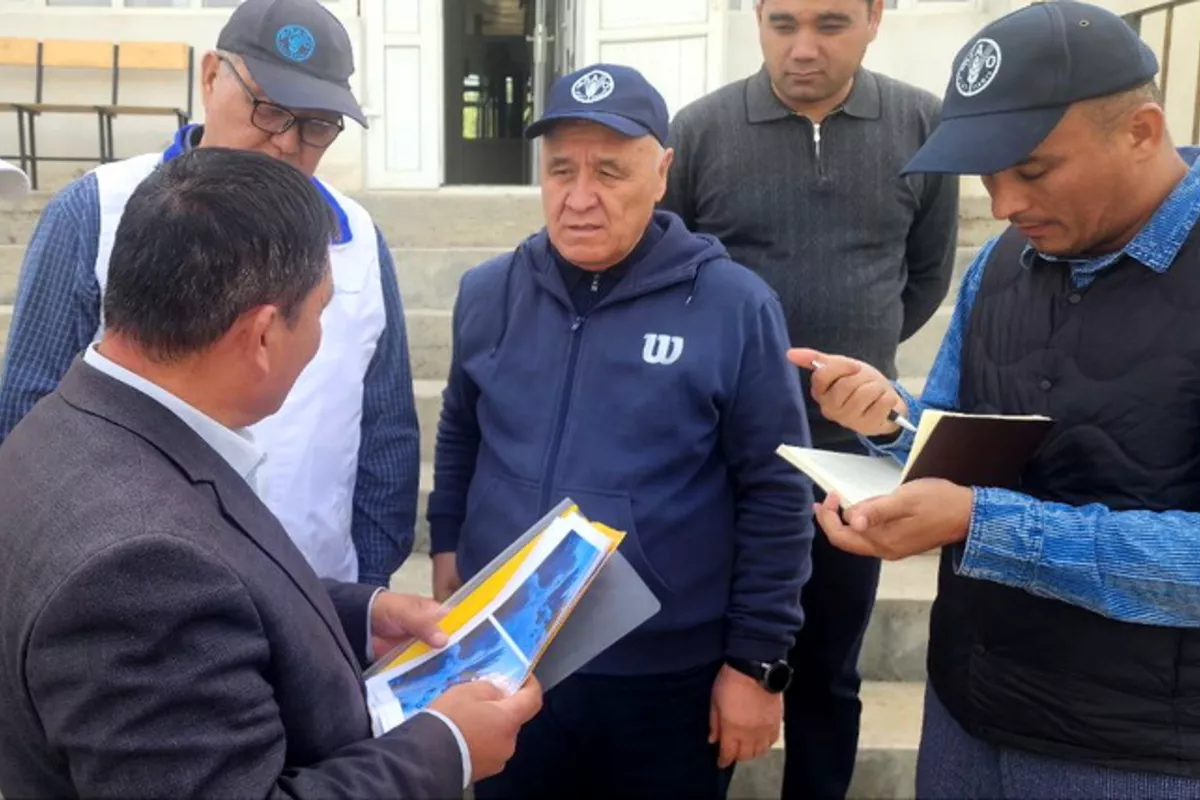
photo: UzDaily.uz
A delegation from Uzbekistan, including representatives of the Food and Agriculture Organization of the United Nations (FAO), has concluded a three-day study visit to the Batken Region of Kyrgyzstan, aimed at examining artificial glacier technology as a potential solution to growing water shortages in Central Asia.
The visit was organized under the framework of the Food Systems, Land Use and Restoration Impact Program (FOLUR-Uzbekistan), an initiative designed to promote sustainable and climate-resilient land and water management, The Caspian Post reports via Uzbek media.
The delegation focused on understanding how artificial glaciers-man-made ice reserves-can help communities manage seasonal water shortages in mountainous areas.
The group was hosted by Mr. Matraim Jusupov, FAO’s National Project Manager in Kyrgyzstan and a specialist in water-saving technologies. Through a combination of workshops and field visits, Mr. Jusupov provided hands-on demonstrations and theoretical insights into the structure and function of artificial glacier systems.
On the first day of the mission, participants attended a detailed presentation on the artificial glacier concept. This was followed by site visits to high-altitude pilot projects on the second day, where the delegation observed practical installations such as gravity-fed pipelines, vertical spray pipes, and water collection systems. Built in collaboration with local communities, these systems stood out for their sustainability, affordability, and effectiveness in managing water flow during dry seasons.
Uzbekistan, where over 90 per cent of agricultural land depends on irrigation, is grappling with serious water scarcity challenges due to climate change, irregular precipitation, and accelerated glacial melt. The situation is particularly severe in regions like Karakalpakstan, Khorezm, and Kashkadarya, where diminishing water resources have negatively impacted crop yields and rural livelihoods.
FAO experts believe artificial glacier technologies could offer a scalable, low-cost, and eco-friendly solution to these challenges, especially in Uzbekistan’s mountainous areas. The Batken model demonstrated how community-driven, context-specific approaches can play a key role in building resilience and securing water access.
Additional water-saving practices introduced during the visit included gravity-based water delivery, rainwater harvesting, and small-scale irrigation systems. These techniques have helped reduce water demand, stabilize household incomes, and ease the labor burden-particularly for women and youth. The approach also fostered greater community involvement and environmental awareness, aligning closely with FOLUR’s principles of agroecology and integrated landscape management.
Aziz Nurbekov, National Project Coordinator of FOLUR-Uzbekistan, highlighted the importance of learning from global best practices:
“Our interest in artificial glacier technology extends beyond Kyrgyzstan. We are also studying successful models from India, Pakistan, and other countries. In India’s Ladakh region, for example, ‘Ice Stupas’ are used to create spring irrigation sources. In Pakistan, similar technologies store river water as ice for use during the growing season. These experiences, along with Batken’s example, show great potential for adapting these solutions to Uzbekistan’s specific environmental and social contexts.”
At the end of the mission, the Uzbek delegation proposed a series of follow-up actions:
Conduct feasibility and hydrological studies tailored to Uzbekistan’s landscape;
Organize training programs and study tours for agricultural specialists and farmers;
Encourage community involvement through labor contributions and co-financing;
Integrate artificial glaciers with modern irrigation and pasture management systems;
Implement digital monitoring tools to track water usage and efficiency.
FAO Uzbekistan plans to maintain close collaboration with its counterparts in Kyrgyzstan and other regional partners to expand knowledge-sharing and promote innovative, climate-resilient water management strategies throughout Central Asia.
Share on social media